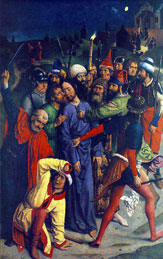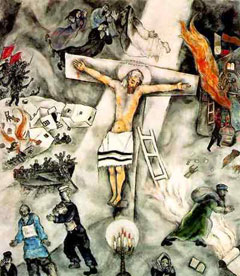
The Blame Game by Deborah Beach Giordano
Not Me?
We are told that every disciple at the shared dinner responds the same way to Jesus’ prediction that one of them will betray him. Despite all they have seen Jesus do, despite the many weeks they have spent in his presence, there’s a measure of doubt in their words, “It won’t be me — will it?”
As it turns out, they will all be guilty. When trouble comes, the entire community runs away, abandoning the Lord they said they loved. Without a single friend or advocate beside him, Jesus will face false accusations, hostile interrogations, mockery and abuse. He will be horribly tortured and die an agonizing death on the cross. Alone.
What If?
 When I was a little girl this whole business really bothered me.
When I was a little girl this whole business really bothered me.
I couldn’t understand why none of Jesus’ friends stayed with him. He was the one the soldiers were there to arrest, he was the one the “bad guys” were after; no one else had any reason to be afraid, as far as I could see. Why did they all run away?
What if some of the disciples had stayed?
What if, instead of tagging along at a safe distance, Peter had gone into the hearing and testified on Jesus’ behalf? What if they all had? What if there had been eleven witnesses who spoke up for the Lord? What if some of the people he had healed had come to his defense? Maybe things would have turned out different.
Necessary Evil?
My Sunday School teachers said that what happened was The Way It Had to Be; the whole series of events was inevitable. In keeping with the divine will, it was necessary for Christ our Savior to be arrested and falsely condemned, to suffer and to die — for only thus would we be redeemed.
That is a heck of thing for a six-year old to imagine. God planned for his own holy Son to be unjustly convicted, mocked, tortured and crucified? Our Lord’s heavenly Father didn’t mind that he would spend his last hours lonely and sad? God wasn’t troubled that Jesus would cry and there would be no one to dry his tears?
That is a heck of a thing to imagine at any age.
Why?
Maybe the truth is quite a bit different; we do not know for certain. The reports we have of “why” these things took place are based on human speculations as Jesus’ followers attempted to explain the reasons behind what happened to him.
 In an effort to understand the full meaning and purpose of the Lord’s mission and ministry, they pieced together their memories of the many things he had said and done. In particular his disciples needed to make sense of the fact that the one they believed to be the Messiah of God had not lead his people to victory against their oppressors, but was condemned and killed by agents of the Roman government.
In an effort to understand the full meaning and purpose of the Lord’s mission and ministry, they pieced together their memories of the many things he had said and done. In particular his disciples needed to make sense of the fact that the one they believed to be the Messiah of God had not lead his people to victory against their oppressors, but was condemned and killed by agents of the Roman government.
Everything that happened — good, bad, or indifferent — was attributed to the divine will. Therefore if Jesus was crucified, it had to be a part of God’s plan. Somehow, for a reason known only to the Eternal Mind, Jesus had to suffer and die in order to fulfill his work.
But that theology raises some serious problems. By extension, when an entire family is murdered by a drunk driver, God intended for that to happen. And when I got caught in the rain without an umbrella it was God’s fault.
Responsibility
What this leaves out of the equation is free will. Human beings are not chess pieces moved by an unseen hand, we are powerful “free agents” with the ability to make choices. We know how to do both good and evil, and our decisions bring consequences — often lasting ones — to ourselves and to others.
 I am troubled by claims that our Creator planned for a beloved Son to be scorned, tortured, and suffer a horrible death. That’s not the God I know, nor the heavenly Father that Jesus proclaimed. Instead, it is an example of scapegoating: by ascribing the tragedy of the cross to “divine will,” we lay the blame on God rather than admit human responsibility.
I am troubled by claims that our Creator planned for a beloved Son to be scorned, tortured, and suffer a horrible death. That’s not the God I know, nor the heavenly Father that Jesus proclaimed. Instead, it is an example of scapegoating: by ascribing the tragedy of the cross to “divine will,” we lay the blame on God rather than admit human responsibility.
It was human sinfulness that condemned the Lord Christ to the cross. Deceit, fear, resentment, anger, greed, envy — the causes were varied, the guilty parties many. These steadily built up against him over the course of his ministry until the weight of evil crushed Jesus' mortal body.
Only One?
And what of the disciple whose name is synonymous with betrayal? Is he not a scapegoat, too? Judas may have been the one who led the troops to Jesus, but (aside from a minor scuffle during the arrest) none of the others stood up for the Lord; no one went in with him to face the Sanhedrin, no one pleaded his case before Pilate, no one sought to sway the crowd to ask that his life be spared.
When given the opportunity to speak out on the Lord Christ’s behalf, his disciples chose to remain silent. Those who had been healed by him, comforted by him, nourished by him, inspired by him — the very ones who had been restored to life through him — did nothing to prevent his death. When the Lord Christ was most in need, “all the disciples deserted him and fled” (Mt 26:56).
All were guilty of betraying the one they claimed to follow.
The Good News
 Despite the betrayals, the magnitude of sin and spite, and the near-universal rejection of Jesus, all was not lost. Despite our failings humanity was not handed over to the condemnation we surely merited. God’s mercy is greater than all our sin. That’s the important thing.
Despite the betrayals, the magnitude of sin and spite, and the near-universal rejection of Jesus, all was not lost. Despite our failings humanity was not handed over to the condemnation we surely merited. God’s mercy is greater than all our sin. That’s the important thing.
Surely that is the message of Jesus and the reason for his Coming: to bring us the Good News of God.
In spite of all that humans have done — and all that we have failed to do — the Holy One did not despair or turn away. God held out hope for us, and held out the Lord Christ to us, that we might be transformed.
Jesus came to show us, first-hand, the power of divine love and forgiveness. He was the word of God made manifest in all that he said and did, in his life and even in his death. His final cry that was unintelligible to the author of Matthew was heard by Luke, “Father, forgive them. They don’t know what they’re doing.”
Forgiveness and love in the face of hatred and betrayal; Jesus was indeed God’s own holy son.
God’s Last Word
His heavenly Father did not pre-arrange for our Lord Christ to be scorned, condemned, tortured and murdered; that tragedy was the result of human choices. Jesus was sent to us as a savior; bearing the keys to the holy kingdom: the gifts of love and understanding. In our ignorance and sin we allowed this divine Messenger to be destroyed.

But God had the last word. The divine response to Christ’s suffering and death was Easter. Death holds no lasting power, evil does not win, sin can impede grace but it cannot prevent it. God always has the last word — and the Word is love and life and abundant joy.
Even in our darkest hour, we have cause for rejoicing.
Virtual hugs and real-time blessings,
Deborah †
Suggested Spiritual Exercise
How is the Gospel reflected in your life?